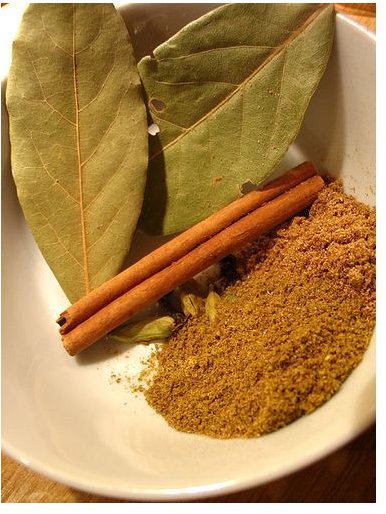Indian Food Spices — The Health Benefits of Cooking with Indian Spices
Enhancing Food with Spices
Many people enjoy Indian food for the characteristic warm, aromatic spices so often used in Indian cooking. Not only are these natural spices and herbs pleasing to the palate, but they are beneficial to the body as well. Many of them have a heating effect on the body, stimulating digestion, circulation, the release of toxins, and even cerebral activity. Others have a more mild, calming, cooling effect. Either way, Indian food spices are a simple, and pleasurable way to uplift food from mere nourishment, to a more stimulating experience.
Tips for Using Indian Spices
Integrating Indian spices into regular cooking habits does take some practice. Many have intense, pungent flavors, while others are more subtle. There are simple tips to follow when cooking with Indian spices, although experimenting to discover what works best for personal taste works as well.
When making a saute or stew of meat, or any other protein, or vegetables, start out with either ghee (clarified butter often used in Indian cooking) or vegetable oil in a hot pan, and add one of the more subtle Indian food spices, such as mustard seeds or cumin seeds. Next add one or more mild powdered spices — coriander and turmeric, then diced fresh ginger and garlic.
After starting with this base of Indian spices, bring in the more aromatic options, such as cardamon or black peppercorns. Also, a traditional blend of warming, aromatic herbs, known as garam masala can be used, although begin with a small amount. Cloves, cardamon, cinnamon, black pepper, nutmeg, and mace are all part of the garam masala blend.
Finally, add vegetables, tofu, or pre-sauteed chicken, any liquids, or accenting flavors, such as coconut or fresh mint, cover, and simmer until cooked. Serve over rice.
List of Indian Spices and Health Benefits
- Asafoetida Often used in traditional Indian cooking, asafoetida is actually a gum extract from a tree. It is aromatic, and pungent before cooking, but provides a garlic-onion flavor to food. As asafoetida is strong, only a small amount is needed. It has a stimulating, warming effect, increasing the release of toxins from the body.
- Cardamon Both green and black cardamon pods have a slightly sweet, refreshing aroma. They increase digestion, clear and sharpen the mind, and improve breathing by opening up airways.
- Cinnamon A strong aromatic, cinnamon is used in small quantities in Indian cooking so as not to overpower food. It has natural antiseptic properties, and is also known as a strengthening, energizing spice. It stimulates digestion and cleansing through sweating.
- Cloves Another potent aromatic, cloves have a warm, pungent flavor. They are wonderful for relieving coughs and congestion.
- Coriander A more subtle spice, coriander seeds stimulate digestion. They have a natural cooling effect on the body, and are useful as a diuretic.
- Cumin This Indian food spice is slightly bitter, warm, and aromatic. It also aids in digestion by increasing the secretion of digestive juices.
- Mustard Mustard seeds relieve congestion, and aid in digestion.
- Nutmeg A pleasing aromatic, nutmeg has a relaxing effect on the body. It is also a traditional brain tonic, increasing mental capability. Nutmeg is known to improve digestion, lower blood pressure, and help the body eliminate toxins.
- Black Pepper A very strong aromatic Indian food spice, black pepper is incredibly warming, and stimulates digestion.
- Turmeric A mild spice on its own, turmeric is known to have natural antibacterial and cleansing properties. It is good for inflammation, and soothing coughs.
Go ahead, be creative, and try integrating Indian food spices into your healthy cooking.
Sources:
Dr. Lad, Vasant. “Ayurveda: The Science of Self-Healing.” (Lotus Press, 1984).
"<em>Indian Cuisine</em>" Thokalath Indian Resources
Photo credit: <em>Frankieb</em>
